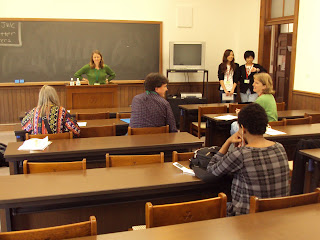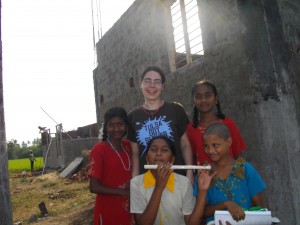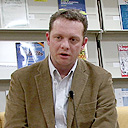Bottleneck Attack!
Matt Leichter (matt [dot] leichter [at] gmail [dot] com) (Saitama-ken 2003-05) is a renegade attorney who plays by his own rules. He operates his own blog, The Law School Tuition Bubble, where he archives, chronicles, and analyzes the rising cost and declining value of legal education in the United States. He also maintains the “Bankruptcy Legal Topics,” and, “Bankruptcy Billables,” sections for Steven Horowitz’s Bankruptcy Bill.
Plenty of people accept the facts about runaway law school tuition, but they think legal education is in a “bottleneck” until the economy recovers and law starts paying off again. Watch me defend the Dojo in, “Bottleneck Attack!”
The Big Bubble Battle (Bart I): Enter the University
Matt Leichter (matt [dot] leichter [at] gmail [dot] com) (Saitama-ken 2003-05) is a renegade attorney who plays by his own rules. He operates his own blog, The Law School Tuition Bubble, where he archives, chronicles, and analyzes the rising cost and declining value of legal education in the United States. He also maintains the “Bankruptcy Legal Topics,” and, “Bankruptcy Billables,” sections for Steven Horowitz’s Bankruptcy Bill.
If American law schools are festering in a tuition bubble, universities must be too! Right? Break out the tako-yaki and watch universities and law schools enter the sumo ring to see which bubble is bigger.
The Juris Doctor Is Your New Bass-O-Matic
Matt Leichter (matt [dot] leichter [at] gmail [dot] com) (Saitama-ken 2003-05) is a renegade attorney who plays by his own rules. He operates his own blog, The Law School Tuition Bubble, where he archives, chronicles, and analyzes the rising cost and declining value of legal education in the United States. He also maintains the “Bankruptcy Legal Topics,” and, “Bankruptcy Billables,” sections for Steven Horowitz’s Bankruptcy Bill.
Like me, many American JETs contemplate going to law school when faced with their contracts expiring. You may hear about the value of the Juris Doctor – the degree that’s so flexible you can do anything with it. Find out why you should recontract and save your yennies by reading this.
How to Present Yourself to a Publisher or Agent at a writers conference
**************
Laura Popp (Mie-ken, 2009-Present) is a current JET who writes fantasy and science fiction for children and young adults, and is an occasional playwright/film maker. Her short work includes a short story titled “In theShadow Realm” and a documentary she made in Malawi. To read about her amazing adventures all over Japan, go to her blog at laurajanepopp.blogspot.com. (And check out the Authors/Books section of the JetWit Library for a list of more writers in the JET-o-sphere.)
Tired of submitting queries to agents and editors and simply getting form rejection letters or worse, NO RESPONSE? Wondering if they`re even bothering to read your stuff? Frustrated by wanting to submit to publishing houses that only receive submissions from agents and “referred” writers? Consider meeting publishers and agents at a conference!
Recently I returned from a writers` conference in my home in Oklahoma and came back with some great success stories to tell. Even better than the wonderful presentations on writing, polishing and marketing were the opportunities for networking and industry contacts. One literary agent asked me for the first fifty pages of my middle grade novel Dargon, another agent requested a proposal for my young adult novel Treasure Traitor, and a publisher from Simon and Shuster asked to see the full manuscripts of BOTH. A travel publisher also requested a proposal for a non-fiction travel-essay book on Japan, and best of all, a Christian magazine publisher accepted one of my stories on the spot! Of course, most of these are just birds in the bush, if you will, but they are certainly a good start.
So how did you do it? you may be wondering. Well, let me tell you…
Do your homework
Many conferences post information about editors and agents who will be attending in advance. Research them and pick the ones that look like they may be interested in your completed fiction projects or non-fiction ideas. Note that most agents and publishers will ONLY consider finished fiction works and proposals for non-fiction articles and books.
Try to make an appointment
If you have the option to make an appointment, Read More
Another Side of Travel
*************
Laura is a current JET who writes fantasy and science fiction for children and young adults, and is an occasional playwright/film maker.
Namaskaram! Greetings from India! Ever consider volunteering abroad? With all our JET paid vacation time, there`s lots of opportunities. It looks great on your resume, and it’s a sure way to give you inspiration for your writing! Why stick to the touristy spots you can read about? You can get a feel for “the real thing” by helping out in the rural villages and slums, and see a part of the world you might never see otherwise.
I definitely just got a feel for the “real India” after spending ten days in Andhra Pradesh building houses and teaching the children of Dalits (untouchables) with five other English teachers through Longitude International. What an amazing experience! The moment we entered Chuvuru village we were greeted by drums and dancing. The people welcomed us into their homes and there seemed no end to the smiles, laughter, and chai tea!
We spent our mornings helping build new cement houses that would stand the tempest of the fall monsoons, and our evenings teaching and playing with the children. In the beginning they were shy and called me “madam,” but within a few hours they completely opened up and called me “sister.” “Sister, one more song, one more photo, one more dance!” Boy, did they love to dance! We taught them the hokey pokey, the Macarena, head-shoulders-knees-and-toes, everything we could think of, and in return they showed us their “Bollywood moves.” They also loved my fife and recorder. Whenever I brought them out, they instantly began shouting requests.
During a game of “let`s travel,” one of the kids asked me, “Your village?” I didn`t know how to respond. Temple, Texas, where I was born? Owasso or Tulsa Oklahoma where I was raised and went to school? Nabari, Japan, where I live now? Malawi, Africa, where I left a huge part of my heart with the AIDS orphans? Or right there in Chuvuru where I felt so at home?
It was a bit of an identity crisis. I asked myself if I really “belong” anywhere. For weeks I`ve been nervous about my upcoming visit back to the States and wondering if it has “changed,” or more importantly, if I`ve changed. Will I feel “at home” in the place my friends and family consider to be my “home?”
After puzzling over it I came to a rather relieving, though somewhat clichéd conclusion. The world is my village. Perhaps that sounds cheesy, but I really think so. Not that I would be welcome let alone feel comfortable anywhere in the world, but I think wherever I do go where there are welcoming hearts and warm smiles, that place will be my home, my village for as long as I am there. And the villagers of India really are so welcoming, so loving that you feel like one of them from the very beginning. There is no insider/outsider. Only friend and family.
Of course, the trip wasn`t all fuzzy feelings. It was very difficult to see how some of the people suffered. Thirty years ago in a nearby village, the government gave the Dalits land to farm, but are now taking it back. This forces the villagers to migrate long distances through dangerous roads or hire themselves out as domestic servants where they are physically and sexually abused. Disease is still a major problem, claiming many lives.
So a lot of people have asked me, why did you bother going to India? There`s not much you can do to help anyway; why not just send money? Sending money is great, but if I`m traveling anyway, I might as well make a difference as I do and experience the “real world.” I can already tell you, those kids and that place are already showing up in my fiction!
We were the first volunteer group to visit Chuvuru, but this is only the beginning of their brighter future. Hopefully many more teams will come to help build and teach, continuing the cause of awareness, human rights, and global friendship. Who knows, maybe you`re next? If you`re interested in learning more about longitude and their work, you can visit their website at http://www.golongitude.org/.
For more details, pictures, and videos about Laura`s adventures in Asia, visit her weekly blog at laurajanepopp.blogspot.com.
Request: Tokyo apartment and language immersion program info
*****
A request from WITLife writer Stacy Smith (Kumamoto-ken CIR, 2000-03):
My friend Ryoko is looking to get some information for a college classmate who is hoping to spend a short time in Tokyo studying Japanese. Can anyone help out with the following questions? If so, please contact her at sr960002 [at] gmail.com. Thank you and yoroshiku onegaishimasu!
1) Do you have any suggestions for safe, short-term apartment leases/rentals in Tokyo? Or any idea of how to search for one?
2) Also, do you have any suggestions for good Japanese language immersion programs in Tokyo? (The kind where you stay in the country/program for 1-3 months.)
Recommendations for intensive Japanese language programs in Tokyo?
Via JETAA DC yahoogroup:
JET alum Jordan Heiber (Fukui-ken, 2000-02) is looking for info/recommendations for intensive Japanese Language Programs in Tokyo — similar to the one offered by Keio University. Requirements would be:
1) year long course
2) qualifies the participant for a student visa for the year
3) ideally close in proximity to Minato Ku
Jordan notes: “The Internet is overflowing with less-than-useful information on this, so I’m hoping some of you may have some insider’s knowledge. Thanks.”
If anyone else in the JET-o-sphere has helpful information, please share in the comments section of this post. Or e-mail jordansensei [/at/] hotmail [/dot/] com.
JET-Popp: Yokohama Children`s Book Conference
**************
Laura Popp (Mie-ken, 2009-Present) is a current JET who writes fantasy and science fiction for children and young adults, and is an occasional playwright/film maker. Her short work includes a short story titled “In theShadow Realm” and a documentary she made in Malawi. To read about her amazing adventures all over Japan, go to her blog at laurajanepopp.blogspot.com. (And check out the Authors/Books section of the JetWit Library for a list of more writers in the JET-o-sphere.)
Hello again! This week I would like to report on the Society of Children’s Book Writers and Illustrators (SCBWI) conference in Yokohama. It actually occurred on November 14th, but, alas, I have been ill with swine flu and other “opportunistic infections” so I was unable to report. But now you get to hear all about it!
For those of you who don`t know, SCBWI is a great group to get involved with if you write for kids. They have lots of events, critique groups, contests, and resources. Here is their website: http://www.scbwi.jp/
A note on transportation. There are many events for writers and translators in Japan, but most are confined to the big cities. For those of you who live in a small town like me, you may be wondering how you will ever get to this wonderful career-building opportunities and still stay within your tight school-teacher budget. Fear not!
There is a wonderful, often overlooked form of transportation in Japan called the night bus. It may seem like a pain, but the bus I took from my home in Nabari to Yokohama was very comfortable. The bus ride was about eight hours, so if I were more accustomed to sleeping on a bus, I probably could have been well rested when we arrived very early in the morning. The earliness gave me plenty of time for sightseeing before the conference, and since my bus home didn`t leave until 11:00pm. Plus it cost less than half than taking the shinkansen, and there`s no need to pay for a hotel!
That said, I was very tired when I arrived back in Nabari at 7:00am. Fortunately it was Sunday, but I would not recommend taking the night bus if you have to go to work the next day. Also, be warned, not all night buses are created equal. Check to see if the bus you want to ride has reclining seats or not, and if there is a bathroom on board or if they stop ever few hours, turn on the lights, and have people jostling past you trying to get in and out constantly. If you are interested in taking a night bus somewhere, I would recommend contacting the main bus station in your town. Most of them don’t speak English, but a Japanese friend helped me get the information and make reservations over the phone. You may be surprised how many places offer night buses to common destinations such as Tokyo, Yokohama, Osaka, etc.
(FYI, Yokohama is famous for its Read More
Just saw a request on the JETAA DC yahoogroup for electronic dictionary recommendations. That seems like a good question to throw out to the JET and JET alum community. So please post your recommendations in the comments section of this post, or send an email to jetwit [/at/] jetwit [/dot/] com.
Yoroshiku!
Popp, Laura (Mie-ken, 2008-Present) is a current JET who writes fantasy and science fiction for children and young adults, and is an occasional playwright/film maker. Her short work includes a short story titled “In theShadow Realm” and a documentary she made in Malawi. To read about her amazing adventures all over Japan, go to her blog at laurajanepopp.livejournal.com. (And check out the Authors/Books section of the JetWit Library for a list of more writers in the JET-o-sphere.)
Hello, everyone! I`m new to Japan and the JetWit blog, so allow me to introduce myself! I`m a sci-fi/fantasy young adult writer from Oklahoma in the U.S. I love to travel, as you can probably tell from my blog, so most of my posts will be about my wonderful adventures all over Asia and any writing news I learn about.
This week I`ll be reporting on two writers` events I attended last weekend, a critique meeting in Osaka and a conference in Kyoto! For those of you who don`t know, there is an excellent group called English Writers and Readers that meets every Saturday in Osaka from 2:30 to however long people want to stay. It’s not just for writers; if you love to read there is also a book club and various other discussion boards and events. But if you are a writer, of any genre or form, you can email your work to group members and have it critiqued the following Saturday. For me it was very productive. They tore apart (figuratively) my story “Tapestry of Time,” but now I know how to make it better. I will warn you that the turnout for meetings tends to be very low (there were only four of us), so if it`s quite a trek for you, I suggest getting a general idea of how many will be there before you go all that way.
One of the girls in the writers` club, Rianna, was really sweet and let me stay with her Saturday night. On Sunday morning, I headed off to the writers’ conference in Kyoto. I was a little disappointed. Good luck trying to publish an English fiction book in Japan, they said, because no publishers here accept them. There are English printers here, however, and a strong potential market of foreign readers. So if you have a book already published elsewhere and would like to promote it in Japan, there are several resources available to you, including Printed Matter Press. Here is their website: http://www.printedmatterpress.com/. And of course, if you want to go the self-publishing route, these guys can help with that too.
.jpg) Other than that, the “Revising Your Novel” seminar, presented by Holly Thompson, was most helpful. Her basic strategy was to systematically go through your novel and create a detailed spreadsheet of necessary revisions in character, setting, theme, etc. and mark these various “threads” wherever they appear with colored sticky notes. Then, read through the novel with only one of these threads in mind. That way you can stay focused and not get bogged down by the sheer size of the project. Here’s a picture of her session:
Other than that, the “Revising Your Novel” seminar, presented by Holly Thompson, was most helpful. Her basic strategy was to systematically go through your novel and create a detailed spreadsheet of necessary revisions in character, setting, theme, etc. and mark these various “threads” wherever they appear with colored sticky notes. Then, read through the novel with only one of these threads in mind. That way you can stay focused and not get bogged down by the sheer size of the project. Here’s a picture of her session:
During lunch, I happened to run into the right people at the right time. I was looking for a place to eat my bento and sat with three ladies outside. We got to talking, and one of the three happened to be Suzanne Kamata (Tokushima-ken, 1988-90) who I`d been trying to get a hold of for some time. She’s an American published young adult writer living in Japan who’s involved in the SCBWI (Society of Children`s Book Writers and Illustrators). She invited me to go to their major conference in Yokohama on November 28th that`s going to host Alvina Ling, a Senior Editor at Little, Brown Books for Young Readers. What an amazing opportunity! For those who are interested, the registration deadline is November 4th. You can sign up at their website, http://www.scbwi.jp/.
To hear more about the Kyoto conference and my other adventures in Japan, visit my full blog at laurajanepopp.livejournal.com!
*****************
JetWit knows that a lot of JET alums are interested in working in the fields of international education programs and student services, so we asked future international ed expert Pam Kavalam (Shiga-ken, 2007-09) to talk to some JET alums in the field and share her conversation for the benefit of the JET alumni community:
Spotlight on University Administration
by Pam Kavalam (Shiga-ken, 2007-09)
Are you looking for a career that can utilize some of the skills you learned over in Japan- cross-cultural exchange, working with students, and (for the truly lucky) the offer to travel again? Think about working at a university- either in international exchange or student affairs. I sat down with Shannan Spisak (Kawasaki-shi, 96-98) to talk about her experience from the JET Program to higher education administration.
Tell me about your journey into the field of international education.
Shannan: After I came back from JET, I moved to New York City with a friend and worked at a private Japanese company for 2 years. I decided to switch careers to move into the international arena; the United Nations in particular interested me. I went on a number of informational interviews with fellow former JETs working in the field and they all recommended graduate school. I decided to study Peace Education and International Exchange at Teachers College, Columbia University. In order to finance my education, I took a job working as Assistant to the President of Barnard College while attending classes part-time. During the process of completing my M.A., I realized I had grown more interested in the education component of my degree than its relation to UN work. Consequently, my focus shifted towards seeking a career in international exchange in higher education.
What do you do now?
Shannan: I work at the Institute of International Education (IIE) in the Global Scholarships Division. The IIE is a 90 year-old non-profit organization that runs over 200 programs around the world, including the Fulbright. I manage three international scholarship programs through the GE Foundation and the Chubb Insurance Foundation. I organize the review and selection of applications, notify finalists, award grants, and manage special components of the scholarships such as Leadership Development Seminars and Career Workshops. I also coordinate Read More
There’s a short article in the New York Times titled “Healthcare Abroad: Japan” which is part of a series that looks at healthcare systems in other countries. It briefly gets at what works well, what the weak points are and why it’s that way.
How do JETs and JET alums feel about Japanese healthcare and the points in this article? Share your thoughts by posting a comment.
See this recent post on JetWit (“JET alumni and healthcare“) for additional discussion of JET alumni and their experiences and concerns with healthcare.
Update: Turns out PBS’ Frontline did a documentary called “Sick Around the World“ which examined the healthcare systems in five countries, including Japan, which you can watch on their website here.
***************
You may have read recently about Eleanor Robinson (CIR Aomori-ken, 1999-2002) and her work with the new Doshisha Global MBA Program which begins in September. Thanks to Eleanor, we’ve also learned about another JET alum, Dr. Andrew Staples (Fukuoka-ken, 1996-99), who is a Special Visiting Professor at Doshisha Business School with a number of published writings that should be of interest to the JET alumni community.
Here’s more about Andrew and his career path so far:
JetWit: We understand your work has been published. Can you tell us what and where?
Andrew: I’ve published a few times with Palgrave in the Asian Business Series including the chapter in the new textbook (we are in the process of making PowerPoint slides to accompany the book, which has been selling well), a chapter in an edited volume titled Emerging Multiplicity, and my own single authored text published last year, Responses to Regionalism, which was based on my PhD thesis.
Publications by Andrew Staples:
- Asian Business and Management: Theory, Practice and Perspectives (see chapter 4)
- Responses to Regionalism in East Asia – Chapter titled “Japanese Production Networks in the Automotive Sector”
- Emerging Multiplicity – Integration and Responsiveness in Asian Business Development
JetWit: What was your path from JET to academics?
A: I was an ALT for two years in a senior high in Fukuoka prefecture before becoming the ALT prefectural coordinator in Fukuoka City for the final year. After JET I enrolled at the School of East Asian Studies (SEAS), University of Sheffield, U.K. to study for an MSc in East Asian Business (1999-2000). I funded this, by the way, with my pension and tax refund and a bit of university English teaching here and there, which is something other JETs could consider doing. Read More
************
From the Summer 2009 “1/4 Cheap Trick” Issue of JQ (JETAA NY Quarterly) Magazine:
Like Japanese Girls? Then You Need This Book
By Rick Ambrosio (Ibaraki-ken, 2006-08)
There I was again, outside my apartment, in the car with Hitomi. Again, at this awkward moment where we both fidget and she puts the Toni Braxton CD in. This is of course, about 10 months ago now, back in Japan. Even after living in Japan for a year and a half, I still had moments like this; social impasses as I liked to call them. We both didn’t know what to say, what to do. Well, in reality, I didn’t know what to say or do. This was before I understood what “nan demo ii” really meant, before I could fully understand all the silent cues. This was before I read David Radtke’s Understanding Japanese Women.
I know I know, you’re thinking, “oh no, not another pick-up line book. Not another cheesy how-to.” It’s what I feared before I started reading it, too. However, I was delightfully surprised that Read More

********************
(Originally posted on April 28, 2009.)
Here’s your chance to help JetWit. Just share a comment on this post saying what you like about JetWit. (Or email your comment to jetwit [at] jetwit [dot] com and I’ll post it.)
Thanks for your help and yoroshiku onegaishimasu.











